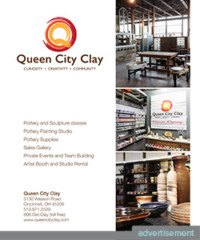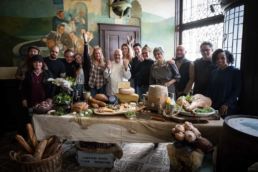words GRACE YEK, CCC, MS | photography DEOGRACIAS LERMA | photography assistant SARAH COCHRAN
 A dark snake coils around Jose Salazar’s upper right arm, slithering upward and flashing its fangs over his right shoulder. Bursts of cherry blossoms punctuate this fearsome tattoo, softening it with a touch of femininity.
A dark snake coils around Jose Salazar’s upper right arm, slithering upward and flashing its fangs over his right shoulder. Bursts of cherry blossoms punctuate this fearsome tattoo, softening it with a touch of femininity.
Perhaps Salazar’s latest skin art elegantly captures his emotive complexion: his affinity for the artistic and his hard-charging yet compassionate ways. “I like to think I have a nice balance between being masculine and feminine,” he says. Salazar’s artistry and tough standards have made him a chef to be reckoned with. He has earned praise in national media publications, such as Saveur online magazine, and is so cherished locally that Cincinnati has all but claimed him as her own.
Born in Medellín, Colombia, Salazar immigrated with his family to the United States when he was four years old. Growing up in the Big Apple, he became smitten with the restaurant world. Salazar enrolled in the New York Restaurant School and cut his culinary teeth working at consequential restaurants owned by chefs such as Jean-Georges Vongerichten, Geoffrey Zakarian, and Thomas Keller.
When Salazar and his wife, Ann, started a family, they sought to downshift to a less hectic lifestyle. In 2008, Salazar left New York and took the executive chef position at the Palace inside the Cincinnatian Hotel.
In December 2013, he put a stake in Cincinnati ground when he opened the farm-inspired Salazar in Over-the-Rhine. Less than two years later, in August 2015, Salazar launched Mita’s in the downtown 84.51⁰ building.

Mita’s
Salazar’s latest restaurant affectionately celebrates his relationship with his 87-year-old grandmother, who still lives in Colombia. In the corridors of his memories, he still sees her joyfully painting and singing on her home patio. “She always seemed so put together, just a confident and very beautiful woman,” he recalls.
This 130-seat restaurant hearkens back to the cultural traditions of Spain and Latin America. The lacy metal screens, Moorish tiles, long chandeliers, and tall yet curvaceous columns embrace the towering space with an old-world majesty that still manages to stay fresh and contemporary. The vibe is confident, put together, and beautiful, just like Salazar’s “Mita.”
Mita’s delights with tapas, ceviches, cured hams, cheeses, and main courses such as paella valenciana. The bar offers wine, beer, and cocktails that lean Spanish. As elegant and as on point as the experience is, don’t call this restaurant “fine dining.” Salazar loathes the designation which, to him, implies “stuffy and exclusive.” He goes on to say, “Just because you buy the fancy silver or have a cheese cart that rolls through the dining room, that does not necessarily mean good food or service.”
In her day, Salazar’s grandmother held the family together and ran a tight household—a trait Salazar embodies in his restaurant business. “She was also gentle and nurturing in the way she took care of us,” he says.
Changing Moments
 Salazar was just two weeks shy of graduating culinary school in New York when the towers came down on 9/11. His school was just a few blocks from the World Trade Center, and he saw the second plane hit the tower.
Salazar was just two weeks shy of graduating culinary school in New York when the towers came down on 9/11. His school was just a few blocks from the World Trade Center, and he saw the second plane hit the tower.
The towers fell as Salazar evacuated the area. “I remember being halfway uptown, and when I turned around, I saw the first tower come down. Then the second,” he says. “It was a very surreal feeling.” That dark moment has deepened his well of compassion. “It reminds you how fragile life can be.”
Salazar freely assists in fundraising events like Bluegrass for Babies, a concert benefit which supports children’s health research and educational programs. His autistic nephew has personalized this cause for him. “We have one kid who’s healthy, happy, and doing well,” he says, referring to his seven-year-old son. Even as Salazar counts his blessings, he wonders if today’s generation is doing enough to conserve the land’s resources. “I have a kid who has to deal with the consequences of our actions.”
For Salazar, being a chef has always been about making people happy, not showing off. “Well, maybe just a little,” he adds, as he curls a smile. Even as he set his sights on the stars, his feet remain grounded. “At the end of the day, I’m a father, husband, and son,” he says.
If Salazar weren’t a chef, he’d likely have gone into furniture carpentry. “I love the craft of making furniture,” he says. His restaurant, Mita’s, affirms his love for design. “After the second restaurant, I fall more and more in love with the designing of a restaurant—how the fabric, tile, and millwork all play together.” He hints that perhaps someday when he retires from the restaurant industry he may go into the business of designing restaurants. “I’m nowhere near that stage yet,” he adds quickly with a chuckle. “But you have to concede at some point there’s someone younger with fresher ideas who can come and take over.”








